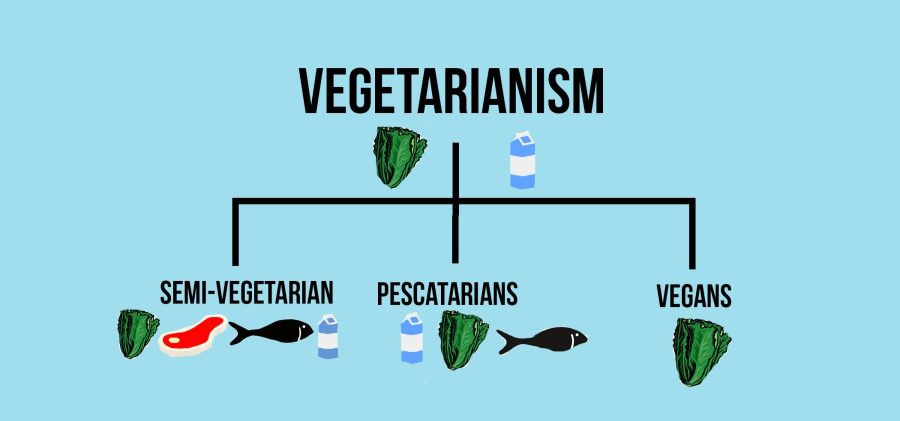Students assess benefits of vegetarianism
Vegetarians speak on advantages and downsides to certain dietary choices and lifestyles
Aiva Petriceks/The Campanile
Students at Palo Alto High School have a variety of diets, ranging from omnivore diets, meat and plant based, to vegetarian diets.
The saying goes,“ you are what you eat.” And in the case of the students of Palo Alto High School, they are a lot of things — omnivores, vegans, vegetarians, pescatarians, and more. This campus has it all. While each diet offers its own benefits and drawbacks, it is important to digest the unique facets of each dietary option.
First, there are people who follow a vegan lifestyle. In addition to avoiding the consumption of meat, fish and poultry, vegans do not consume any animal products or byproducts.
One of the main concerns with being a vegan is the potential deficiency of nutrients from a lack of nutrients from essential food groups. While there certainly are nutritional concerns, senior Emma Raney, a vegan, has found that one can compensate for the nutrients lost by not consuming meat through consuming other substitutes, including fruits, vegetables and regular supplements.
“There are a lot of fruits that have a lot of iron, [and] spinach is well known for iron and [vitamin] B12,” Raney said. “My doctor recommended that I take calcium and make sure [I’m] eating the right combinations of food to get the correct amino acids into [my] system, so it does take a little more thought into preparing your food.”
There are many substitutes for most ingredients restricted in a vegan diet. Soy milk, rice milk, oat milk and nut milk are all viable alternatives for cow’s milk, while puréed soft tofu, Ener-G egg replacer and flax egg are substitutes for egg in baked goods. Vegan margarines, canola, sunflower and olive oil are ingredients that can replace butter, and ice cream with soy bases, rice bases and nut bases are healthy, delicious options for vegans.
Although the vegan diet can be easy to adapt to, it is extremely important to conduct sufficient research and converse with the appropriate doctors to ensure one’s health while making new, vegan dietary choices.
“If you’re thinking about becoming vegan, it’s really important that you do the right research to make sure you’re eating enough because the typical foods are a little bit lower in calories,” Raney said. “Read up on reasons why you should be doing this other than the initial reason you were thinking about.”
Then, there are people who follow the vegetarian lifestyle. Vegetarians abstain from eating meat but still eat animal products. For some, the choice behind the vegetarian lifestyle stems from a distaste for meat. Senior Chloe Mo, a vegetarian, attributed part of her reasoning for being a vegetarian to her food preferences.
“I feel repulsed by meat and do not enjoy the taste of meat,” Mo said.
Other explanations for being vegetarian are health related reasons, as research has proven the longevity of eating a meatless diet.
“It’s been [shown] through many studies that vegetarians, in general, live five years longer than omnivores,” Mo said. “Vegans live, on average, 10 years longer [than omnivores].”
Research has shown that a vegetarian diet, in comparison to a diet with meat, wards off more diseases and keeps weight down, according to an article from the Vegetarian Times.
A vegetarian diet usually contains less fat, lowering the risk of heart disease, diabetes, obesity and a variety of cancers. Furthermore, vegetarianism can give a person more energy, if he or she eats the right foods like more carbohydrates.
In general, another reason why some choose to have vegan, all vegetarian or semi-vegetarian diets is the benefits to the environment.
“The emissions produced by cows and other farm animals are harmful to the ozone layer, and [methane] contributes about 11 percent to the total carbon emissions in the atmosphere,” Mo said.
According to the United States Environmental Protection Agency (EPA), livestock production for the food industry is a primary source of methane emissions in the atmosphere.
“Domestic livestock such as cattle, buffalo, sheep, goats, and camels produce large amounts of [methane] as part of their normal digestive process,” the EPA stated on its online page for climate change. “Also, when animals’ manure is stored or managed in lagoons or holding tanks, [methane] is produced. Because humans raise these animals for food, the emissions are considered human-related. Globally, the Agriculture sector is the primary source of methane emissions.”
Besides deterring the progression of global warming through greenhouse gasses, vegetarianism is also known to conserve water usage.
“Many nutrients are more easily absorbed through plant-sources than animal ones,” Mo said. “Being vegetarian has huge environmental benefits — especially since we’re in a drought. It takes a lot more water to produce enough grass to create one pound of beef than it does to create one pound of vegetables.”
Another common motivation behind choosing to adopt vegetarian or vegan diets is compassion for the animals which are slaughtered to provide meat and animal products. Senior and vegetarian Hannah Zucker cited her unease with the killing of animals as her reason for becoming a vegetarian.
“My elementary school had a farm on it, and I had a hard time accepting the idea that we could play with an animal during the day and then also eat the same type of animal for dinner,” Zucker said.
Even students who are not vegetarian view vegetarianism as a driving force behind proper animal treatment. Junior Ibby Day recognizes the benefits of vegetarianism, despite partaking in a omnivorous lifestyle.
“Personally, I think that vegetarians’ dietary restrictions do help the cause because in recent years there has been a major public shift in how animals are treated, and I think this animal rights awareness was sparked in part by vegetarians,” Day said. “I completely support the animal rights movement and I definitely do feel guilty sometimes for not being a vegetarian or vegan.”
Despite apparent drawbacks to the vegetarian and semi-vegetarian lifestyle, there are numerous environmental, ethical and health advantages to adopting a more specialized lifestyle choice, which encourage many people to become vegetarian.
Your donation will support the student journalists of Palo Alto High School's newspaper














Veganfie • Oct 26, 2022 at 1:57 am
Hey Sarah, thanks for sharing this wonderful school work. If schools continue with such great work, students will understand how veganism and vegetarianism keeping positive impact on the environment.